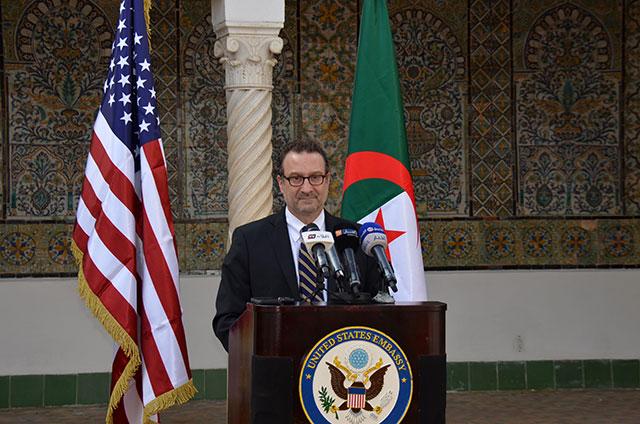- International News
- Friday-2021-01-08 | 11:33 am

A US envoy visited Algeria on Thursday as part of a regional tour to discuss issues including the Libya conflict and disputed Western Sahara, officials said.
David Schenker, assistant secretary of state for Near Eastern Affairs, was accompanied by US Secretary of the Air Force Barbara Barrett and General Jeffrey Harrigian, the US Air Force commander in Europe and Africa, the US embassy said.
"Our two countries have many shared interests, particularly in promoting regional stability," Schenker said in a statement.
Algeria's foreign ministry said the visit would help reinforce talks between the two countries on "bilateral, regional and international issues of common interest" including Libya and Western Sahara.
Algeria shares borders with conflict-riddled Libya and is the key foreign backer of the Polisario Front, which has campaigned for independence in the Western Sahara since the 1970s.
Morocco, another Algerian neighbour, normalised ties with Israel in December in a deal brokered by the US, which recognised Morocco's sovereignty over the disputed Western Sahara.
The Morocco-Israel deal was criticised by Algeria, with Prime Minister Abdelaziz Djerad slamming "foreign manoeuvres which aim to destabilise" his country.
A fragile ceasefire has been in place since October in Libya, where rival administrations agreed to ink a truce and pave the way for political talks leading to elections later this year.
Barrett said Algeria had "much hard-earned expertise in security and countering violent extremism, and we have nothing but respect for its capabilities".
Schenker said the US was looking for opportunities to deepen trade ties with Algeria as the country seeks to diversify its oil-reliant economy.
The diplomat, who arrived from Jordan and is set to travel to Morocco, held talks on Thursday with Algerian Foreign Minister Sabri Boukadoum.
"The meeting was a chance to hold a complete and frank assessment of bilateral ties between the two countries and exchange views on the role expected by the United States to confront current challenges on the international and regional levels," Boukadoum tweeted.













